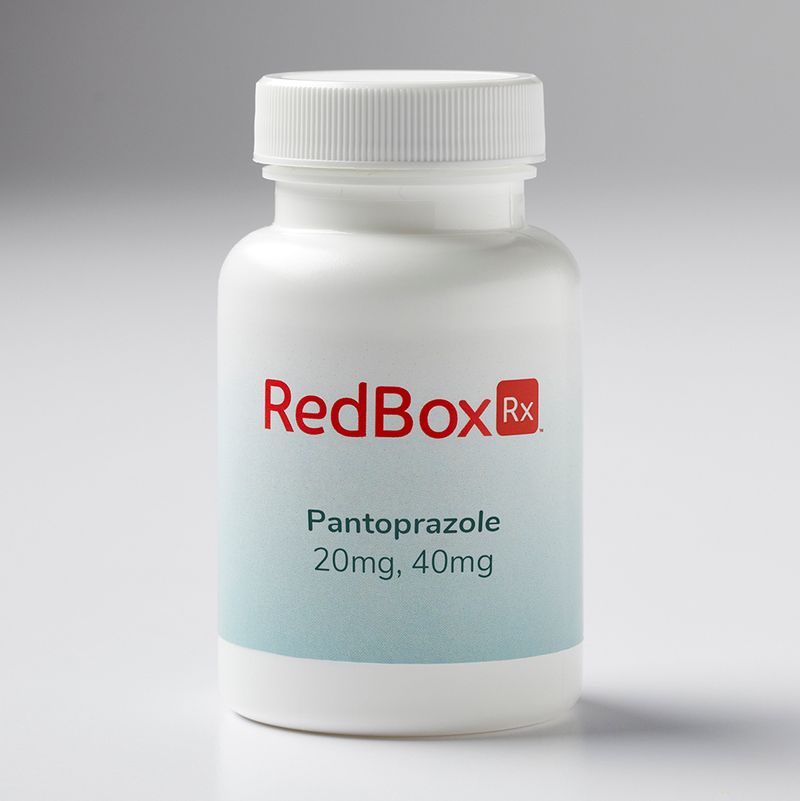Pantoprazole (Generic Protonix) FAQs
-
Pantoprazole is used to treat damage from gastroesophageal reflux disease (GERD), a condition in which backward flow of acid from the stomach causes heartburn and possible injury of the esophagus (the tube between the throat and stomach) in adults. Pantoprazole is used to allow the esophagus to heal and prevent further damage to the esophagus in adults with GERD. It is also used to treat conditions where the stomach produces too much acid, such as Zollinger-Ellison syndrome in adults. Pantoprazole is in a class of medications called proton-pump inhibitors. It works by decreasing the amount of acid made in the stomach.
-
Pantoprazole comes as a delayed-release tablet to take by mouth. For the treatment and maintenance of GERD, pantoprazole is usually taken once a day. For the treatment of conditions where the stomach produces too much acid, pantoprazole is usually taken twice a day. The delayed-release tablets are usually taken with or without food. Take pantoprazole at around the same time(s) every day. Follow the directions on your prescription label carefully, and ask your doctor or pharmacist to explain any part you do not understand. Take pantoprazole exactly as directed. Do not take more or less of it or take it more often or for a longer period of time than prescribed by your doctor.
Swallow the tablets whole; do not split, chew, or crush them.
Continue to take pantoprazole even if you feel well. Do not stop taking pantoprazole without talking to your doctor. If your condition does not improve or gets worse, call your doctor.
-
Before taking pantoprazole,
tell your doctor and pharmacist if you are allergic to pantoprazole, dexlansoprazole (Dexilant), esomeprazole (Nexium, in Vimovo), lansoprazole (Prevacid, in Prevpac), omeprazole (Prilosec, in Zegerid), rabeprazole (AcipHex), any other medications, or any of the ingredients in pantoprazole tablets or granules. Ask your pharmacist for a list of the ingredients.
tell your doctor if you are taking rilpivirine (Edurant, in Complera, Odefsey). Your doctor will probably tell you not to take pantoprazole if you are taking this medication.
tell your doctor and pharmacist what prescription and nonprescription medications, vitamins, nutritional supplements, and herbal products you are taking or plan to take. Be sure to mention any of the following: anticoagulants (blood thinners) such as warfarin (Coumadin, Jantoven), atazanavir (Reyataz), dasatinib (Sprycel), digoxin (Lanoxicaps, Lanoxin), diuretics ('water pills'), erlotinib (Tarceva), iron supplements, itraconazole (Onmel, Sporonox), ketoconazole (Nizoral), methotrexate (Trexall, Xatmep), mycophenolate mofetil (Cellcept), nelfinavir (Viracept), nilotinib (Tasigna), and saquinavir (Invirase). Your doctor may need to change the doses of your medications or monitor you carefully for side effects.
tell your doctor if you have or have ever had a low level of magnesium in your blood, low levels of vitamin B-12 in your body, osteoporosis (a condition in which the bones become thin and weak and break easily), or an autoimmune disease (condition in which the body attacks its own organs causing swelling and loss of function) such as systemic lupus erythematosus.
tell your doctor if you are pregnant, plan to become pregnant, or are breastfeeding. If you become pregnant while taking pantoprazole, call your doctor.
talk to your doctor about the risks and benefits of taking pantoprazole if you are 70 years of age or older. Do not take this medication for a longer period of time than recommended by your doctor.
-
Unless your doctor tells you otherwise, continue your normal diet.
-
Take the missed dose as soon as you remember it. However, if it is almost time for your next dose, skip the missed dose and continue your regular dosing schedule. Do not take a double dose to make up for a missed dose.
-
Pantoprazole may cause side effects. Tell your doctor if any of these symptoms are severe or do not go away:
headache
nausea
vomiting
gas
joint pain
diarrhea
dizziness
Some side effects may be serious. If you experience any of the following symptoms, call your doctor immediately, or get emergency medical help:
blistering or peeling skin
rash hives; itching; swelling of the eyes, face, lips, mouth, throat, or tongue; difficulty breathing or swallowing; or hoarseness
irregular, fast, or pounding heartbeat muscle spasms; uncontrollable shaking of a part of the body; excessive tiredness; lightheadedness; or seizures
severe diarrhea with watery stools, stomach pain, or fever that does not go away
rash on cheeks or arms that is sensitive to sunlight
increased or decreased urination, blood in urine, fatigue, nausea, loss of appetite, fever, rash, or joint pain
Pantoprazole may cause other side effects. Call your doctor if you have any unusual problems while taking this medication.
People who take proton pump inhibitors such as pantoprazole may be more likely to fracture their wrists, hips, or spine than people who do not take one of these medications. People who take proton pump inhibitors may also develop fundic gland polyps (a type of growth on the stomach lining). These risks are highest in people who take high doses of one of these medications or take them for one year or longer. Talk to your doctor about the risks of taking pantoprazole.
If you experience a serious side effect, you or your doctor may send a report to the Food and Drug Administration's (FDA) MedWatch Adverse Event Reporting program online (http://www.fda.gov/Safety/MedWatch) or by phone (1-800-332-1088).
-
Pantoprazole is $15 per month at RedBox Rx. No insurance required and no membership fees.
Our online consultation for heartburn, indigestion or upset stomach costs only $25.
-
Keep this medication in the container it came in, tightly closed, and out of reach of children. Store it at room temperature and away from excess heat and moisture (not in the bathroom).
It is important to keep all medication out of sight and reach of children as many containers (such as weekly pill minders and those for eye drops, creams, patches, and inhalers) are not child-resistant and young children can open them easily. To protect young children from poisoning, always lock safety caps and immediately place the medication in a safe location - one that is up and away and out of their sight and reach. http://www.upandaway.org
Unneeded medications should be disposed of in special ways to ensure that pets, children, and other people cannot consume them. However, you should not flush this medication down the toilet. Instead, the best way to dispose of your medication is through a medicine take-back program. Talk to your pharmacist or contact your local garbage/recycling department to learn about take-back programs in your community. See the FDA's Safe Disposal of Medicines website (http://goo.gl/c4Rm4p) for more information if you do not have access to a take-back program.
-
In case of overdose, call the poison control helpline at 1-800-222-1222. Information is also available online at https://www.poisonhelp.org/help. If the victim has collapsed, had a seizure, has trouble breathing, or can't be awakened, immediately call emergency services at 911.
-
Keep all appointments with your doctor and the laboratory. Your doctor may order certain laboratory tests before and during your treatment, especially if you have severe diarrhea.
Before having any laboratory test, tell your doctor and the laboratory personnel that you are taking pantoprazole.
Do not let anyone else take your medication. Ask your pharmacist any questions you have about refilling your prescription.
It is important for you to keep a written list of all of the prescription and nonprescription (over-the-counter) medicines you are taking, as well as any products such as vitamins, minerals, or other dietary supplements. You should bring this list with you each time you visit a doctor or if you are admitted to a hospital. It is also important information to carry with you in case of emergencies.
-
Protonix®
-
We offer a variety of prescription medication options for heartburn and indigestion including:

Affordable GERD, heartburn and indigestion treatment online.
Feeling the bloating or the burn that goes with indigestion or heartburn is uncomfortable. Fast treatment is where RedBox Rx comes in, offering an easy online assessment and FDA-approved prescription medications shipped to your door. Your first step towards relief is to start an online consultation with one of our experienced, licensed medical providers.
- No membership or subscription fees.
- Low-cost telehealth consult with a licensed medical provider.
- Pantoprazole starting at $15 per month.
- Confidential, private and secure.
- Free standard shipping or expedited/overnight available.
Sorry, we’re closed for today. Our U.S. licensed medical providers are available daily 7 a.m. to 9 p.m. CST via live video visit. We look forward to serving you soon. Email us anytime at [email protected].





